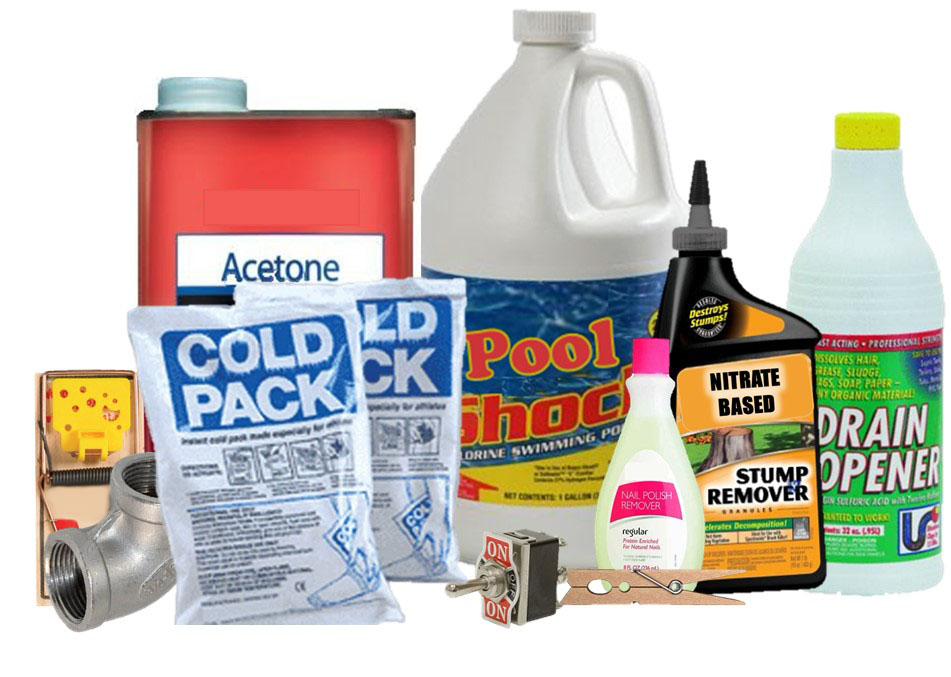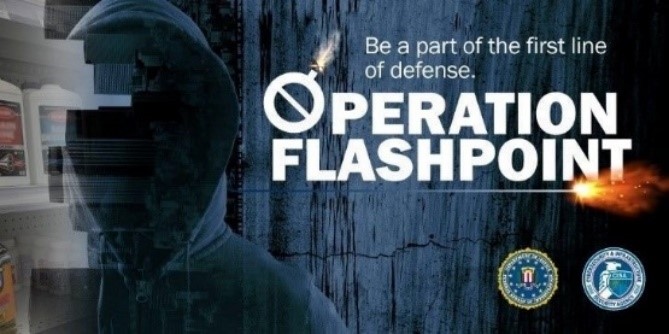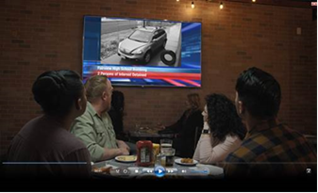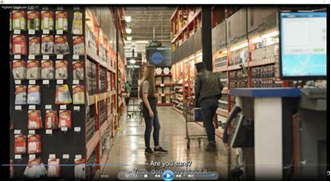How Easy is It to Make a Home Made Bomb
The Bomb-Making Materials Awareness Program (BMAP), a counter-terrorism risk management bombing prevention program sponsored by the Cybersecurity and Infrastructure Security Agency's (CISA) Office for Bombing Prevention (OBP), BMAP focuses on restricting access by malicious actors to explosive precursor chemicals, explosive powders, exploding target materials, associated components, and delivery methods. The program is most effective during the terrorist attack cycle's planning phase. The two focus areas of BMAP are the acquisition of materials and bomb-building stages. In addition, BMAP conducts outreach, training and awareness with the private and public sector stakeholders, which increases awareness of those everyday products that terrorists, criminals and others can use to make a bomb or other dangerous explosive mixtures and/or device.
National Program Goals
- Restrict access by malicious actors to bomb-making materials (BMM) and explosive precursor chemicals (EPC) used to manufacture homemade explosives (HME) and destructive devices.
- Provide early detection of the sale of HME precursor chemicals and BMM to suspect individuals.
- Prevent diversion and theft of HME precursor chemicals and BMM by malicious actors.
- Build a network of vigilant and informed stakeholders who serve as the Nation's Counter-IED "eyes-and-ears" as the first line of defense in providing early detection of potential terrorist attacks and criminal activity.
Program Pillars
- Operation Flashpoint
- Corporate Outreach
- Federal, State, Local, Tribal and Territorial Engagement
- International Outreach and Collaboration
Program Benefits
- Strengthens prevention, mitigation and risk management opportunities
- Increases BMM awareness for communities
- Enhances public/private partnerships
- Increases private sector point-of-sale awareness
- Improves first responder and emergency services BMM awareness
- Increases identification of suspicious activity and purchasing behavior
- Improves recognition and reporting to appropriate officials
- Promotes community-based outreach
- Provides free, secure access to training, videos and awareness materials
- Provides reporting mechanisms to track and measure success
Operation Flashpoint
 CISA and FBI partnership designed to promote voluntary reporting of suspicious activity through outreach and awareness programs to private sector and public safety stakeholders in order to prevent acquisition of Explosive Precursor Chemicals for nefarious use.
CISA and FBI partnership designed to promote voluntary reporting of suspicious activity through outreach and awareness programs to private sector and public safety stakeholders in order to prevent acquisition of Explosive Precursor Chemicals for nefarious use.
Increase the awareness of businesses that sell EPCs, explosive powders, and other BMM on the risks and how they can voluntarily contribute to security.
Visit our Operation Flashpoint webpage to learn more.
Community Awareness and Training
BMAP provides a wide array of awareness products and resources designed to share counter-IED awareness information to prevent, protect against, respond to, and mitigate bombing incidents
BMAP PSA 1 – Vigilant Neighbor
 There are many events that can occur before a bombing where people have different opportunities to spot certain indicators. In this video, a young woman observes a news report of a bombing that occurred at the local high school the night before, she pays close attention as the news anchor requests for help identifying a suspicious vehicle seen leaving the scene. Following; a delivery driver arrives to drop off a package and the young woman meets the driver outside. The two begin discussing the horrific event and eventually, the suspicious activity that has continuously occurred at her neighbors across the street. The young woman recalls that her neighbors parked a similar vehicle in their driveway to the one described on the news, they discuss the strange mannerisms the neighbors have, the suspicious activities that take place, and the trash left outside of their home. The young woman realizes she should have called in the suspicious activity and immediately calls the police.
There are many events that can occur before a bombing where people have different opportunities to spot certain indicators. In this video, a young woman observes a news report of a bombing that occurred at the local high school the night before, she pays close attention as the news anchor requests for help identifying a suspicious vehicle seen leaving the scene. Following; a delivery driver arrives to drop off a package and the young woman meets the driver outside. The two begin discussing the horrific event and eventually, the suspicious activity that has continuously occurred at her neighbors across the street. The young woman recalls that her neighbors parked a similar vehicle in their driveway to the one described on the news, they discuss the strange mannerisms the neighbors have, the suspicious activities that take place, and the trash left outside of their home. The young woman realizes she should have called in the suspicious activity and immediately calls the police.
BMAP PSA 2 – Vigilant Manager
 This video occurs at a local sports bar and stems from the Suspicious Activity Report submitted by the young woman in the "Vigilant Neighbor" video. The news anchor announces that a male and female suspect are wanted in connection to the bombing. The four individuals in the video, Mike, Megan, Rich, and Rachel begin discussing the event; and elaborate on how easy it is to purchase certain chemicals and materials from local businesses, and then use those materials to make a bomb. During their discussions, Rich states that many of the chemicals used in historical bombings could have been purchased from Mike (store manager) and Megan's Pool Supply Store. Criminals, extremists, and terrorists will go to great lengths to secure the items they need to build a bomb; and in this instance – they stole chemicals from Mike and Megan's pool supply store and Mike did not report the theft during his daily inventory. This exemplifies your role in preventing bombing attacks.
This video occurs at a local sports bar and stems from the Suspicious Activity Report submitted by the young woman in the "Vigilant Neighbor" video. The news anchor announces that a male and female suspect are wanted in connection to the bombing. The four individuals in the video, Mike, Megan, Rich, and Rachel begin discussing the event; and elaborate on how easy it is to purchase certain chemicals and materials from local businesses, and then use those materials to make a bomb. During their discussions, Rich states that many of the chemicals used in historical bombings could have been purchased from Mike (store manager) and Megan's Pool Supply Store. Criminals, extremists, and terrorists will go to great lengths to secure the items they need to build a bomb; and in this instance – they stole chemicals from Mike and Megan's pool supply store and Mike did not report the theft during his daily inventory. This exemplifies your role in preventing bombing attacks.
BMAP PSA 3 – Vigilant Employee
 This video occurs at a local hardware store where the store manager, who while watching the news in his office sees the two suspects have been identified and arrested in connection to the bombing attack at the local high school. After the news scene, two of his employees walk in and discuss with their manager that the bomber had been in their store the week before. They tell the manager that the bomber asked for more chemicals, requested the cutting of galvanized pipes, requested endcaps for those pipes, and paid with cash to avoid Credit Card detection. The purchased materials are not vast in quantity but are suspicious due to them being purchased together. Couple this with the bomber's hesitation in discussion and cash purchase are all indicators of suspicious activity. Had these employees had the knowledge of the possible nefarious usage of the products in their store, they would have had the confidence to report the suspicious purchases and possibly thwart a bombing attack.
This video occurs at a local hardware store where the store manager, who while watching the news in his office sees the two suspects have been identified and arrested in connection to the bombing attack at the local high school. After the news scene, two of his employees walk in and discuss with their manager that the bomber had been in their store the week before. They tell the manager that the bomber asked for more chemicals, requested the cutting of galvanized pipes, requested endcaps for those pipes, and paid with cash to avoid Credit Card detection. The purchased materials are not vast in quantity but are suspicious due to them being purchased together. Couple this with the bomber's hesitation in discussion and cash purchase are all indicators of suspicious activity. Had these employees had the knowledge of the possible nefarious usage of the products in their store, they would have had the confidence to report the suspicious purchases and possibly thwart a bombing attack.
Bomb-Making Materials Awareness: Your Role (AWR-911)
Website: Center for Domestic Preparedness
Audience: General public, public safety dispatchers, law enforcement, fire and emergency medical technicians, and fusion center analysts
Course Length: 40 minutes
Recommended Prerequisites: None
Description: The Bomb-Making Materials Awareness: Your Role course uses an immersive, graphic novel style storytelling approach to educate and empower community members on how to identify and report suspicious activity and purchasing behaviors related to bomb-making materials. Download a printer-friendly fact sheet for the Bomb-Making Materials Awareness: Your Role Course.
Bomb-Making Materials Awareness Employee Training (AWR-921)
Website: Center for Domestic Preparedness
Audience: Beauty supply stores, home improvement stores, online retailers, pool supply retailers, and other retailers
Course Length: 35 minutes
Recommended Prerequisites: None
Description: The Bomb-Making Materials Awareness Employee Training course teaches participants how to recognize suspicious purchasing behaviors in a retail setting that might indicate Bomb-Making activity and what to do when a suspicious incident occurs. Download a printer-friendly fact sheet for the Bomb-Making Materials Awareness Employee Training Course.
Bomb-Making Materials Awareness Program (BMAP) Community Liaison Course (MGT-450)
Participants: 15-25
Audience: This course is designed for public safety and private sector personnel identified as Community Liaisons or perform community outreach as part of their role.
Course Length: 1 day (8 hours)
Recommended Prerequisites:
- AWR-921: Bomb-Making Materials Awareness Employee Training
- Suspicious Activity Reporting (SAR) Explosive Precursors Point of Sale Training
Description: This one-day, in-person, instructor-led training prepares participants to conduct outreach in their communities by familiarizing them with explosive precursor chemicals and components found in common household products used to make bombs. It also provides them the ability to recognize suspicious purchasing behaviors, and access BMAP resources. Download a printer-friendly fact sheet for the BMAP Community Liaison Course. To learn more, please email bmap@cisa.dhs.gov.
First Responder Emergency Services Explosive (FRESE) Briefing
Participants: 15-25
Audience: First responders, including police, fire, emergency medical services and emergency management professionals.
Course Length: 2 hours
Recommended Prerequisites:
- AWR-911: Bomb-Making Materials Awareness: Your Role
- AWR-921: Bomb-Making Materials Awareness Employee Training
Description: This in-person, instructor-led briefing prepares participants to conduct outreach in their communities by familiarizing them with explosive precursor chemicals and components found in common household products used to make bombs. It is designed for first responders who may be tasked with or assigned to responding to calls for service that may include explosives, bomb-making materials (BMM) and/or home-made explosives. It also provides them the ability to recognize suspicious purchasing behaviors, and access BMAP resources. Download a printer-friendly factsheet for the FRESE Briefing. To learn more please email bmap@cisa.dhs.gov.
Retail Explosives Awareness Prevention and Reporting (REAPR) Briefing
Participants: 15-25
Audience: Intended for attendees familiar with retail sales and the products sold by their respective employer.
Course Length: 1.25 hours
Recommended Prerequisites:
- AWR-921: Bomb-Making Materials Awareness Employee Training
Description: This in-person, instructor-led REAPR Briefing is intended to educate retailers and promote the awareness and reporting of suspicious activity to prevent the misuse of common household items such as HME precursor chemicals and IED components. It is designed for retail and corporate employees involved in online or point-of-sale customer service, sales, security, loss presention or any other type of retail outreach. Download a printer-friendly factsheet for the REAPR Briefing. To learn more please email bmap@cisa.dhs.gov.
Suspicious Activity Reporting (SAR) Explosive Precursors Point of Sale Training
Website: NSI Training Website
Audience: Commercial retail and sales personnel
Course Length: 1 hour
Recommended Prerequisites: None
Description: Available from the Nationwide SAR Initiative (NSI), this interactive course instructs sales personnel involved at the point of sale on behaviors and indicators that are reasonably indicative of potential terrorist and/or criminal bomb-making activity; how and where to report suspicious activity; and how to protect privacy, civil rights, and civil liberties when documenting information. It also instructs personnel of the types of suspicious activity that might be observed during their daily duties.
Reporting Suspicious Activity
Businesses, their employees, and the public play a critical role in safeguarding their communities by recognizing and reporting suspicious purchases or other behaviors that indicate potential bomb-making activities.
To report suspicious activity, call 1-855-TELL-FBI (1-855-835-5324) or contact your local law enforcement. In the event of an emergency, call 9-1-1.
Additional Information
For more information about CISA's Bomb-Making Materials Program, email bmap@cisa.dhs.gov or download a printer-friendly BMAP fact sheet.
Source: https://www.cisa.gov/bmap
Belum ada Komentar untuk "How Easy is It to Make a Home Made Bomb"
Posting Komentar